Allende, Pinochet and Beyond: 50 Years of Chilean Politics
Looking back at Chile's political history from President Salvador Allende's presidency to today A demonstrator carries a portrait of late former President Salvador Allende during a march to commemorate the anniversary of the coup that toppled President Allende and brought dictator General Augusto Pinochet to power 49 years ago, in Santiago, Chile, Sunday, Sept. 11, 2022. The anniversary comes one week after Chileans overwhelmingly rejected a new constitution to replace its dictatorship-era charter. (AP Photo/Matias Basualdo)
This is Part of the "Chile’s Utopia Has Been Postponed" Dig series
A demonstrator carries a portrait of late former President Salvador Allende during a march to commemorate the anniversary of the coup that toppled President Allende and brought dictator General Augusto Pinochet to power 49 years ago, in Santiago, Chile, Sunday, Sept. 11, 2022. The anniversary comes one week after Chileans overwhelmingly rejected a new constitution to replace its dictatorship-era charter. (AP Photo/Matias Basualdo)
This is Part of the "Chile’s Utopia Has Been Postponed" Dig series
November 1970-1973
The Allende Years
Socialist Salvador Allende becomes the first democratically elected Marxist president in history. His Popular Unity coalition expands democracy, adheres strictly to rule of law, nationalizes U.S. copper mines and other major industry, while carrying out an agrarian reform. A militant right-wing opposition in control of congress and the media, and backed by the Nixon administration, undertake a destabilization program. Chile is thrown into chaos and hyperinflation even as Allende’s popularity continues to rise.
November 1973-November 1989
The Pinochet Dictatorship
Gen. Augusto Pinochet leads a bloody military coup on Sept. 11, 1973. Allende takes his own life as the national palace is bombed and set ablaze. A fierce military dictatorship abolishes congress and all political parties. More than 3,200 people are killed, 1,100 disappeared, tens of thousands of tortured and massive numbers seek exile. The military imposes a neo-liberal economic program that strips all worker rights, reverses much of Allende’s nationalizations and privatizes social security, education, water and other essential services, creating the so-called Chilean Model that is praised by powerful elites globally.
December 1989- October 2019
The Disappointment of Civilian Rule
After Chileans vote to deny Pinochet an extension of his dictatorship, a new center-left civilian government wins the elections and takes power a few months later. Laboring under a straight-jacket constitution imposed in 1980 by Pinochet, the governing coalition, known as La Concertacíon — an alliance of the Christian Democratic Party and very moderate Socialist Party — promises much but delivers little reform. Over the next 30 years, Chile’s economy finally begins to grow again (until 2015-2016) but so does radical inequality as well as access to social services. The center-left Concertacíon begins to alternate power with a right-wing bloc led by billionaire Sebastian Piñera who wins election twice in different periods. The Pinochet constitution is modified a number of times but never scrapped. The basic Pinochet economic model is left intact with minor reforms. Political apathy and disillusionment set in as the expectations of radical post-Pinochet change fail to materialize.
October 2019- March 2020
The Social Explosion
On Oct. 7, 2019 Piñera decrees a 4% increase in subway fares setting off a massive student rebellion where metro stations are burned and street protests erupt. Within days Chile is paralyzed by a “social explosion” bringing more than a million people into the streets on Oct. 25. “It’s not 30 pesos, it’s 30 years” becomes the favorite chant. Piñera cancels the subway hike but declares “war” on the protests and sends the military and the military police into the streets, provoking a major conflagration. More than 30 people are killed, 2,500 wounded and an equal number arrested. As many as 200 protesters are fully or partially blinded as police intentionally aim pellets and rubber bullets projectiles at the eyes.
Nov. 15, 2019
A New Constitution?
An agreement is reached in Congress among all parties to hold a plebiscite asking two questions: Should there be a new constitution and, if yes, what should the mechanism be?
Mar. 15, 2020
COVID-19
The COVID crisis hits and Piñera takes advantage and orders a severe lockdown and nightly curfew that will keep Chileans off the streets for months at a time. The protests are extinguished.
October 2020
The Constitution Vote
Some 80% of Chileans vote to seat a popularly-elected, bottom up constitutional assembly to write a new charter. Voter turnout is 51%.
December 2021
The Election of Gabriel Boric
35-year-old former student leader Gabriel Boric wins 55% of the vote in presidential elections, representing the Frente Amplio, a new alliance independent of the traditional center-left parties discredited by the previous 30 years of ineffectiveness. He wins in the second round. In the first round, right-wing extremist Jorge Kast wins 28% and Boric 25%. In the runoff, Kast takes 44% of the vote. Kast becomes the new Bolsonaro of Chile. In March, a bearded and tattooed Gabriel Boric took power three months later as the youngest head of state in the world. His cabinet brims with “outsiders” and millennials, and 50-50 gender parity. It’s the first authentically Left Chilean government since Allende and it pointedly excludes almost anyone formerly allied with La Concertacíon.
July 2022
New Constitution Revealed
The ultra-democratic constitutional assembly presents a draft constitution of 388 articles that span from meat and potato reforms to utopian concepts granting Nature a set of rights. The campaign for and against approval of the draft is heated with the Right flooding the field with fake news warning Chileans that the new constitution will strip them of their private property among other scare tactics.
Sept. 4, 2022
Constitution Rejected
Against all predictions, and in a compulsory vote, 68% of Chileans reject the new constitution. It comes as a severe blow to Boric and his government who had invested much of his political capital in a different outcome. The government sees itself forced to move more to the center to re-stabilize. As the national debate turns to crime, immigration and inflation, pushing aside social justice concerns, Boric begins to incorporate leading figures of La Concertacíon into the cabinet.
Mar. 11, 2023
The Boric Government Anniversary
Boric completes his first year in power as the Chilean government moves into a new and second process to approve a new constitution by the end of the year. The political crisis in Chile deepens.
Your support is crucial…With an uncertain future and a new administration casting doubt on press freedoms, the danger is clear: The truth is at risk.
Now is the time to give. Your tax-deductible support allows us to dig deeper, delivering fearless investigative reporting and analysis that exposes what’s really happening — without compromise.
Stand with our courageous journalists. Donate today to protect a free press, uphold democracy and unearth untold stories.
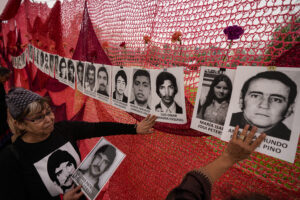
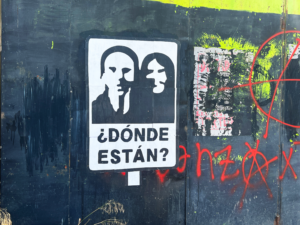

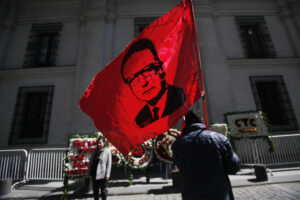
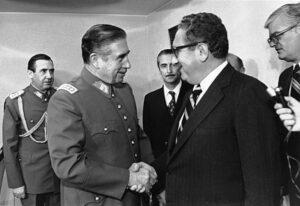
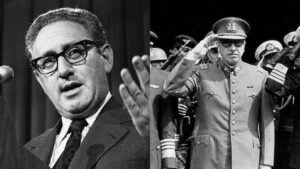
You need to be a supporter to comment.
There are currently no responses to this article.
Be the first to respond.